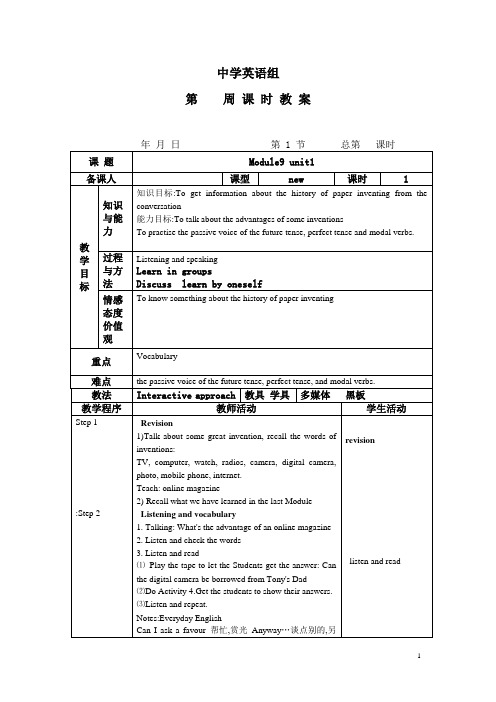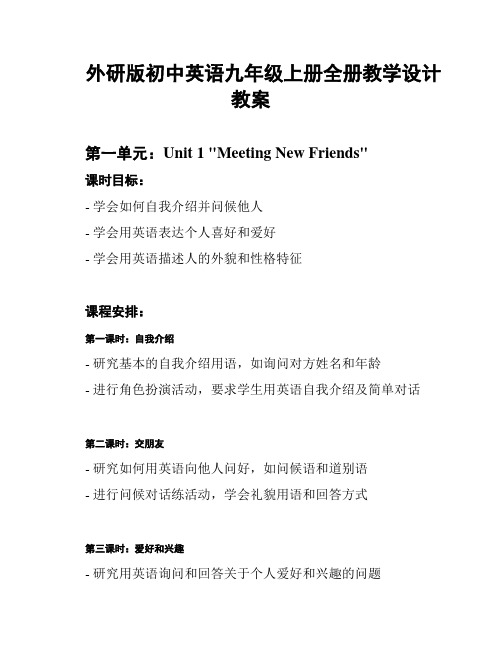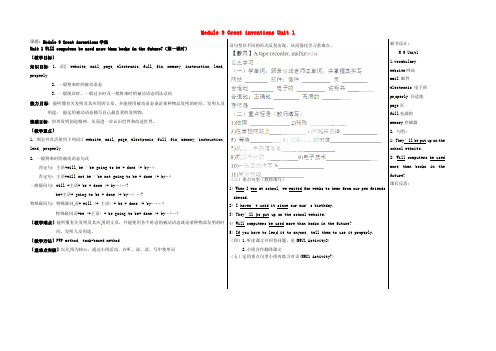【外研版九年级英语上册】Module 9 Unit 1 教案
Module 9 Unit 1 示范课教学设计(外研版九年级英语上册)

Module 9 Great inventions Unit 1 Will computers be used more than books in the future?教学设计一、教学目标1. 词汇:borrow, put up, mainly, thousands of, page, electronic, powerful, full, fix, instructions,lend, properly2. 句型:They’ll be put up on the school website.Will computers be used more than books in the future?3. 识别并感知一般将来时的被动语态。
4. 能听懂有关发明及其应用的对话。
5. 培养学生在朗读中准确把握意群并正确断句的能力。
6. 能够了解并谈论新技术给人类生活带来的变化并激发学生发明创造的热情。
二、教学重点及难点重点:1. 能听懂和阅读关于介绍发明方面的对话。
2. 一般将来时的被动语态及其各种句式。
难点:能听懂有关发明及其应用的文章,并能使用各个时态的被动语态谈论某种物品发明的时间、发明人及用途。
三、教学准备多媒体课件四、相关资源五、教学过程Step 1 Warm-upWatch the video and answer the questions.How many inventions are mentioned in the video? What are they?设计意图:通过视频的方式呈现历史上的重大发明,调动学生积极思考表达,进而引入本节课的主题。
Step 2 Pre-listeningT shows three pictures of new inventions in our modern life and talk about them with Ss.1. Look at the pictures and answer the questions in pairs.2. Discuss possible answers as a class.3. T helps Ss to know more new inventions.设计意图:通过图片谈论今日话题“Inventions”既可以活跃课堂气氛,还调动了学生的学习兴趣。
外研版九年级英语上册教案 Module9 Unit1 (3)

Module 9Great inventionsUnit 1Will computers be used more than books in the future?Ⅰ.Teaching modelListening and speakingⅡ.Teaching aims1.To know something about the important inventions in our life2.To get information about some inventions from the conversation3.To talk about the advantages of some inventionsⅢ.Teaching aidsTape recorder,OHP,videoⅣ.Teaching Steps第一课时(Activity 1-Activity 3)Step 1:Warming up and lead in1.Talk about some great inventions;recall the words of inventions:TV,computer,watch,radios,camera,digital camera,photo,mobile phone,internet,etc.2.Recall what we have learned in the last module.Step 2:Ask and answer1.Show some pictures in Activity 1(a computer,a camera,a cellphone).2.Work in pairs.Look at the pictures and answer the questions.(1)How have these inventions changed people's lives?(2)Which one do you think is the most important?(3)What other important inventions can you think of?Step 3:Listening1.Let the students look through the sentences in Activity 2 carefully.2.Play the tape.Listen and complete the sentences.(1)Lingling loves her mobile phone because she can________.(2)All of Daming's friends' numbers are ________in his phone.(3)Today's cameras are better than old cameras because they do not ________and the photos can________.(4)Lingling thinks everything ________by computers to some degree,so the computer is ________invention.3.Let students read the sentences aloud.4.Then play the tape again,and check the answers.Step 4:Listening and reading1.Play the tape.Let the students listen to the conversation in Activity 3 and answer the following questions:(1)What does Tony want to borrow from his father?(2)How do people get information now according to the conversation?(3)How many inventions are mentioned in the conversation?2.Read it and underline all the points which are important to the class.3.Show the points to the class,and explain some difficulties to them.4.Read the summary of the conversation.Underline the wrong information and correct it.Then share it with the class.5.Ask the students to work in pairs,and act out the conversation.Step 5:Everyday EnglishI wonder…Perhaps.Here it is.Promise!Step 6:Homework1.Learn the new words by heart.2.Act out the conversation in groups.3.Finish off the workbook exercises.Blackboard DesignUnit 1Will computers be used more than books in the future? 1.invent/invention/inventor2.borrow/lend3.will be used4.can be seen on the Internet5.hear from6.take good care of it。
2016外研版九年级英语(上)Module9 unit1教案

1
Step3 Step4 Step5
外
Here it is. 给你,在这儿 It doesn't matter. 没关系 I'll see to that. 我会处理的. Is that clear 清楚吗 懂了 吗 Promise! 我一定!
language Points
1) Paper and printing have been used for ages. for ages ---- for (many) years 好多年了. 类似短语: for hours/ days/months 等.
Interactive approach 教具 学具 多媒体Leabharlann 黑板教师活动学生活动
Revision 1)Talk about some great invention, recall the words of inventions: TV, computer, watch, radios, camera, digital camera, photo, mobile phone, internet. Teach: online magazine 2) Recall what we have learned in the last Module Listening and vocabulary 1. Talking: What's the advantage of an online magazine 2. Listen and check the words 3. Listen and read ⑴ Play the tape to let the Students get the answer: Can
Listen and repeat
外研版九年级英语上册教学设计《Module 9 Great inventions Unit 1》

外研版九年级英语上册教学设计《Module 9 Great inventions Unit 1》一. 教材分析《Module 9 Great inventions Unit 1》主要介绍了四大发明:造纸术、印刷术、指南针和火药。
本课旨在让学生了解中国古代的四大发明及其对世界文明发展的贡献。
教材通过讲述这些发明的历史背景、发明过程以及它们对人类社会的影响,激发学生对科学知识的兴趣,培养学生的创新意识。
二. 学情分析九年级的学生已经具备了一定的历史知识,对四大发明有一定的了解。
但在英语表达方面,学生可能对这些发明的英文名称和描述还不够熟悉。
因此,在教学过程中,教师需要帮助学生回顾相关历史知识,并加强英语表达的训练。
三. 教学目标1.知识目标:–学生能够掌握有关四大发明的英文名称和简单描述。
–学生能够用英语简要介绍四大发明及其对世界文明的影响。
2.能力目标:–学生能够运用所学知识,进行听力、口语、阅读和写作的训练。
–学生能够通过合作学习,提高与他人沟通和协作的能力。
3.情感目标:–学生能够激发对科学知识的兴趣,培养创新意识。
–学生能够认识到中华文明的伟大,增强民族自豪感。
四. 教学重难点•学生能够掌握有关四大发明的英文名称和简单描述。
•学生能够用英语简要介绍四大发明及其对世界文明的影响。
•学生能够运用所学知识,进行听力、口语、阅读和写作的训练。
•学生能够通过合作学习,提高与他人沟通和协作的能力。
五. 教学方法1.任务型教学法:通过完成各种任务,激发学生的学习兴趣,培养学生的实践能力。
2.合作学习:鼓励学生分组讨论,提高学生的沟通和协作能力。
3.情境教学法:创设情境,让学生在真实的环境中运用所学知识。
4.语法翻转教学法:通过引导学生发现和总结语法规则,提高学生的语言运用能力。
六. 教学准备1.教师准备PPT,展示四大发明的图片、历史背景和英文描述。
2.教师准备相关历史资料,以便在课堂上为学生提供更多相关信息。
外研版初中英语九年级上册全册教学设计教案

外研版初中英语九年级上册全册教学设计
教案
第一单元:Unit 1 "Meeting New Friends"
课时目标:
- 学会如何自我介绍并问候他人
- 学会用英语表达个人喜好和爱好
- 学会用英语描述人的外貌和性格特征
课程安排:
第一课时:自我介绍
- 研究基本的自我介绍用语,如询问对方姓名和年龄
- 进行角色扮演活动,要求学生用英语自我介绍及简单对话
第二课时:交朋友
- 研究如何用英语向他人问好,如问候语和道别语
- 进行问候对话练活动,学会礼貌用语和回答方式
第三课时:爱好和兴趣
- 研究用英语询问和回答关于个人爱好和兴趣的问题
- 研究常用的动词和形容词,用于描述自己的爱好和兴趣
第四课时:人的外貌和性格
- 研究基本的描绘人的外貌和性格的词汇和表达方式
- 进行描述人物的活动,学生互相描绘对方的外貌和性格特征
教学资源:
- 课本:外研版初中英语九年级上册
- 角色扮演卡片
- 录音设备
评估方式:
- 口语表达能力评估:根据学生的自我介绍和对话表现评估其口语表达能力
- 书面作业评估:布置写作作业,学生需写一篇关于自己的爱好和兴趣的短文
注意事项:
- 强调学生的参与和互动,鼓励他们多与同桌进行对话练
- 为学生提供充足的练机会,以提高口语表达能力
- 鼓励学生积极参与描述人物的活动,培养他们的观察能力和用词准确性。
九年级英语上册 Module 9 Unit 1(第1课时)教学案 (新版)外研版

Module 9 Great inventions Unit 1课题: Module 9 Great inventions学案Unit 1 Will computers be used mo re than books in the future?(第一课时)【教学目标】知识目标:1. 词汇website, mail, page, electronic, full, fix, memory, instruction, lend, properly2. 一般将来时的被动语态3. 一般现在时、一般过去时及一般将来时的被动语态用法总结能力目标:能听懂有关发明及其应用的文章,并能使用被动语态谈论某种物品发明的时间、发明人及用途;能运用被动语态描写自己最喜爱的发明物。
情感目标:培养发明创造精神,从而进一步认识世界和改造世界。
【教学重点】1. 领会并灵活使用下列词汇website, mail, page, elect ronic, full, fix, memory, instruction, lend, properly2. 一般将来时的被动语态句式肯定句:主语+will be / be going to be + done (+ by…)否定句:主语+will not be / be not going to be + done (+ by…)一般疑问句:will +主语+ be + done (+ by…)…?be+主语+ going to be + done (+ by…) …?特殊疑问句:特殊疑问词+ will (+ 主语) + be + done (+ by…)…?特殊疑问词+be (+主语) + be going to be+ done (+ by…)…?【教学难点】能听懂有关发明及其应用的文章,并能使用各个时态的被动语态谈论某种物品发明的时间、发明人及用途。
【教学方法】PWP method, task-based method【重难点突破】以介绍为核心,通过小组活动,在听、说、读、写中使单词及句型以不同的形式反复出现,从而强化学习重难点。
外研版九年级英语上册M9u1教案

C.has completedD.is completed
2.﹣﹣﹣Could I_____ your cell phone,please?I want to call my father.
﹣﹣﹣Sorry.It has been taken away _______ Lisa.( )
A.borrow;byB.lend;toC.use;forD.show;at
3.This place _______ a factory but now it is a park.( )
A.used to beingB.used to be
C.is used toD.using to be
4.When you are swimming,________ your ears.You can use earplugs(耳塞)to stop water getting into your ears.( )
12.the memory card储存卡13.be fixed被修复
14.read the instructions看说明书
15.take good care of sb.照顾好某人=look after sb. well
16.lend sth. to sb.把某物借给某人
e sth. properly使用得当,正确地使用
短语: 1.张贴,公布____ 2.成千上万________
任务二:听读课文,回答下列问题。
1.Tony would like to take some photos on the school visit to the museum __________
2019秋外研版九年级英语上册Module 9 unit1教案设计

Module 9 Great inventions一、教学内容:Unit1 Will computers be used more than books in the future?二、课型:Listening and speaking三、教学目标:●Knowledge objective1. Words: borrow,website,mail,textbook,mainly,page,electronic,powerful,memory,full,fix,instructions, lend, properly2. Expressions: put up, thousands of●Ability objective1.To listen and read the materials about computer.2.To make a dialogue about the wide use of the computer.●Moral objective1. To arose Ss’ interest in great inventions.2. To make Ss be proud of our great inventions in our country.3. To make Ss love our country and study hard.四、教学重难点:1、能听懂和阅读关于介绍发明方面的对话。
2、能运用所学的知识介绍自己认可的一件伟大发明及其优点。
五、教学准备:本次课堂为听说课,主要采用互动式教学法,创设真实语境,通过个人呈现,同伴互动,小组活动等师生、生生的交流,充分体现了学生在学习过程中的主体地位,教师只是课堂的引导者,组织者和合作者,让学生在使用中学会英语,综合培养学生的英语语言运用能力。
在教学过程中,采用多媒体手段辅助教学,利用各种图片和习题任务贯穿整个教学过程。
因此,本节课需准备:PPT课件、录音机、课堂练习。
- 1、下载文档前请自行甄别文档内容的完整性,平台不提供额外的编辑、内容补充、找答案等附加服务。
- 2、"仅部分预览"的文档,不可在线预览部分如存在完整性等问题,可反馈申请退款(可完整预览的文档不适用该条件!)。
- 3、如文档侵犯您的权益,请联系客服反馈,我们会尽快为您处理(人工客服工作时间:9:00-18:30)。
Unit 1 Will computers be used more than books
in the future?
教学目标
【知识目标】
1.词汇website, mail, page, electronic, full, fix, memory, instruction, lend, properly
教学反思
3 I will do what you tell me to do.
4Answer the questions.
electronic fix instruction invention lend mail page website
1 How do you fix a camera if the memory is full?
1.领会并灵活使用下列词汇website, mail, page, electronic, full, fix, memory, instruction, lend, properly
2.一般将来时的被动语态及其各种句式
【教学难点】
能听懂有关发明及其应用的文章,并能使用各个时态的被动语态谈论某种物品发明的时间、发明人及用途。
Step 10 Exercises
Let students do more exercises to master the language points.
1. I want to ____ your bike to go to he museum.
A. keep B. lend C. borrow
1. They’ll be put up on the school website.
2. And they can be seen on the Internet by other classes.
3. Will computers be used more than books in the future?
Step 6 Everyday English
Let Ss say the everyday English that they have learnt in the passage.
•I wonder …•Perhaps.•Here it is.•Promise!
Step 7 Language points
2. You must promise that you’ll take good care of it.
2.Now listen again and repeat.
Step 9 Acting
1.Work in pairs. Talk about the advantages of these inventions.
6 What is an example of electronic technology?
7 When you lend something to someone, what do they have to do later?
8 What do you think is the most important invention in human history?
mainly表示“大部分地,主要地”。是副词。它的形容词为main。例如:
We mainly get food from the land and sea.我们主要从陆地和海洋获取食物。
4. Some were huge ones with thousands of pages.
thousands of表示“成千上万的”。
我们需要多少钱才能做好这件事?
Step 8 Listening
1.Listen and mark the pauses.
1. They’ll be put up on the school website. And they can be seen on the Internet by other classes, even people living in other countries.
put up表示“张贴,公布”。例如:
You can put up the notice on the noticeboard.你可以把通知贴在布告栏上。
3. In the past, we mainly got information from paper books.
in the past表示“在过去”。
2.一般将来时的被动语态
3.一般现在时、一般过去时及一般将来时的被动语态用法总结
【能力目标】
能听懂有关发明及其应用的文章,并能使用被动语态谈论某种物品发明的时间、发明人及用途;能运用被动语态描写自己最喜爱的发明物。
【情感态度目标】
培养发明创造精神,从而进一步认识世界和改造世界。
教学重难点
【教学重点】
1. What will Tony do on the school visit to the museum?
2. Where did we get mainly information in the past?
Step 5 Reading
1.Find out the sentences which belong to the passive voice in the dialogue.
教学过程
Step 1 Leading-in
Ss look the pictures and answer the questions.
Step 2 Presentation
Look and say. The teacher shows the pictures of new words and let the students to say as soon as possible.
2All of Daming’s friends’ numbers are _______ in his phone.
3Today’s cameras are better than old cameras because they do not ________ and the photos can ______________.
6. That can be fixed.
此句为含有情态动词的被动语态。结构为情态动词+be+过去分词。
fix v.修补,挽救
例如:The broken window need to be fixed.这个破窗户需要修补。
7. If you have to lend it to anyone, tell them to use it properly.
3.Find the sentences in the conversation which mean:
1 Changing the subject, can I get t he camera?
2 It is not a problem. I will use another memory card.
1. Can I borrow your camera?
borrow表示“借入”lend表示“借出”
borrow sth. from sb.表示“向某人借某物”。例如:
I borrowed a book from the library yesterday.昨天我从图书馆借了一本书。
2. They’ll be put up on the school website.
3. What other important inventions can you think of?
Step 4 Listening
1. Listen and complete the sentences.
1Linging loves her mobile phone because she can ______________.
2. The poster will ______ on the wall in our classroom tomorrow.
A. be put up B. put up C. to be put up
3. Pandas _____ live on bamboo in Sichuan Province.
2 When do you need to read the instructions?
3 How often do you send messages by mail?
4 How many pages does this book have?
5 Which website do you often go to when you get online?
A. main B. mainly C. properly
4. There are ________ people waiting in line.
A. thousand of B. thousands ofC. thousand D. two thousands
课堂作业
请介绍一下你眼中最伟大的发明。60词左右。
Step 3 Look and say
Look at the pictures and answer the questions in pairs.
1. How have these inventions changed people’s lives?
2. Which one do you think is the most important?
lend v.(把某物)借出,借给(某人)
lend sth. to sb.表示“把某物借给某人”
例如:Tom lent his book to me last month.上个月汤姆把书借给了我。
